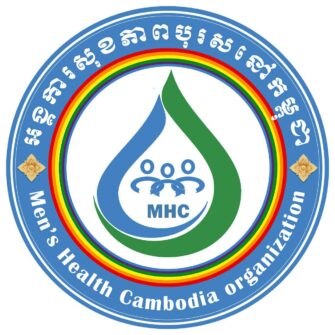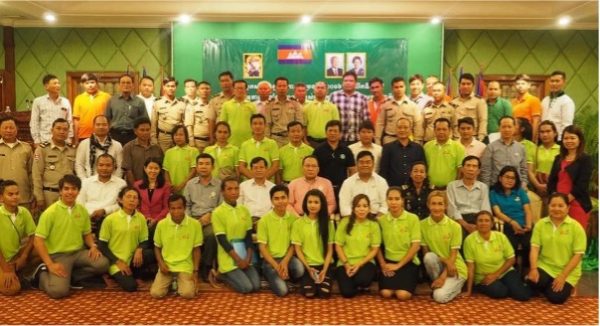Men’s Health Cambodia’s Work
Men’s Health Cambodia (MHC) was registered on 25th April 2002, and received recognition by the Ministry of Interior as a dynamic motivated working group of men who have sex with men and transgender people, drug users and other vulnerable people, working to identify health needs and creating an environment to support those need. They have eight sub-offices in Siem Reap, Kandal, Kampong Cham, Tbong Khmum, Prey Veng, Kampong Speu, Preah Sihanouk and Takev province.
- Mission: To improve the quality of life of Key Population (MSM/TG, drug users, entertainment workers and other vulnerable groups) to prevent HIV/ AIDS and STI transmission, and provide vocational training skill to them for improving their living conditions.
- Vision: To see Key Population (KPs) live healthy lives, recognized within society, and having career opportunities in the future.
- Goal: Contribute to eliminating new HIV infections, strengthening health systems and promoting diversity, rights, and gender equity.
Human Resources:
- Northern Zone – RHAC (Global Fund Funding Request): 2 Field Staff and 8 Outreach Workers
- Southern Zone – KHANA (Global Fund Funding Request) 3 Senior Management staff, 10 Management staff and 16 Field staff and 71 Outreach Workers
HIV Program
Project Goals:
- To reach 95-95-95 by 2025
- To reduce new HIV infections
- To reduce HIV/AIDS-related mortality
Project Objectives:
- Streamline and optimize prevention interventions for key populations (KP)
- Improve case-finding for KP and other affected populations
- Improve the quality of care for Antiretroviral Therapy (ART) clients at facility and community levels
- Improve co-infection management to further reduce morbidity and mortality among PLHIV
Project Strategy:
- Improving Case Detection
- Target and track individual MSM and TG and the health services they receive, updated prior to quarterly mapping data.
- Identifying risk status through risk screening and assign UIC code for MSM/TG.
- Actively encourage all MSM/TG in its target area to become MStyle and Srey Sros members and promote Srey Sros program representative.
- Hosting peer-driven intervention approach (PDI+) to identify risk status and define HIV case detection across MHC coverage areas.
- Avoiding New Infection and Reducing HIV Risks
- Demonstrate condom application during individual and group outreach sessions and provide referral cards for STI, VCCT and other targeted health services at every outreach contact. Referral cards will be collected each month from health facilities to track services uptake.
- MHC outreach worker encourage MSM/TG to receive HIV testing through finger prick or HIVST.
- Field staff acting as case manager provider (CMP) to ensure MSM and TG and partners who have a reactive test are referred to a confirmatory test at VCCT Pre-ART site.
- Implementing/hosting pilot of HIV self-testing in Phnom Penh city.
- Strengthening Active Referral and Service Linkage
- Document integrated reactive cases.
- Promoting service use and providing referral card to clients during every contact in hotspots. Referral made to HTC testing, STI screening.
- Accompanying and following up with HIV-positive MSM/TG and partners for anti-retroviral therapy (ART) referral to licensed hospitals.
- Referring TGs to access hormone therapy treatment and counseling services.
- Identify MSM/TGs who experience violence and refer to GBV service within 72 hours for the assault.
- Referring MSM/TGs who are raped to emergency medical care (PrEP), and get victims access to counseling, legal aid and reporting to the police.
- Build the capacity of partner organization staff, partners and stakeholders to plan, coordinate, implement, manage and monitor the program
- Monitoring is an important component of any project or program, hence project management and technical inputs will be routinely monitored to ensure all targets are being met, high work standards are being maintained and project outputs continue to reflect the needs of the target populations, and are in accordance with goal, strategies and activities.
LGBT+ Rights
Integrating LGBT+ rights and encouraging inclusion at national and regional level, responding to gender-based violence (GBV) and providing mental-health therapy.
- Transgender community representative involved with stakeholders in community and involved with technical working groups at the National level to represent the voice of the LGBT+ community at the National level and within wider civil society
- Responding to gender-based violence in the community in collaboration with CCHR, WNU and police to address these issues and assist with legal aid
- Providing awareness-raising, psychological and mental health support to the community and identifying community members with trauma or mental-health issues and referring to therapy
Follow MHC online
Cambodian attitudes towards the LGBTQ+ community have become more accepting and understanding in the past thirty years. In 2004, then-King Norodom Sihanouk expressed his acceptance of gay marriage. His announcement was a sign of the times – that Cambodia, mainly in the capital and other cities such as Siem Reap, was becoming more positive towards people in these communities. The nation held its first “Pride” events, and human rights and sexual orientation and gender identity rights NGOs and related organizations started to appear, one after another. Still, the stigma of being an openly gay or transgender person in Cambodia is not universally dismantled. People living in big cities are more likely to be accepted compared to those in small towns or the countryside.
Vichet Kem, Program Manager, Men’s Health Cambodia (MHC) in Common misconceptions and the overlap between anti-gender and anti-gay rights sentiment in Cambodia






